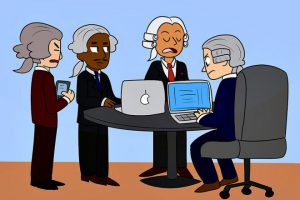Order In The Mud
In addition to reading, writing, and communication, users of a multi-user domain can collaborate, play, and form communities. The creation of new virtual communities forces the participants and creators to consider the conduct that is appropriate for them, and in turn how the multi-user domain will function when transgressions or conflicting principles inevitably arise and impede the participant’s regular usage of the domain. This decision regarding how to govern conflict generates additional conflict itself, due to the division between those who view the multi-user domain as an independent realm that should not be restricted by any ruling body, and those who prefer that domains, as societies players invest themselves in similarly to their non-virtual communities, have stability through a sort of legal system. Despite concerns of restricting the individual, the presence of characters with assigned authority in multi-user domains improves users’ experiences in such virtual societies.
Firstly, the presence of a governing individual or organisation keeps users in line with designated rules. In the instance of the ENGL342 One O’clock community, made up of University of Otago students in 2017, the librarians serve as the ruling body, and address infractions to the rules of the community by reminding the community of any missteps. This is seen when a Reader disobeys the rules of their position and The Librarian responds “Actually, a researcher should have corrected me.” Such a correction serves the dual purpose of lightly reprimanding a user for acting in a way they are not supposed to, and clarifying to the rest of the community what went wrong to avoid future confusion and further mistakes of a similar nature from changing the domain into an environment different from the one it was intended to be. The advantage of a governing body in this scenario is that characters have someone to look to for an official, consistent ruling that could not be provided in a lawless domain.
Additionally, an authoritative body saves the community from stagnating. In the example of ENGL342, this can be seen repeatedly in both the librarians assisting the group with its cooperative quest. This includes providing new information or redirection, such as “The Researcher formerly known as Reader Niall had the beginning of an idea, some minutes past” when the group otherwise would be left exploring unproductive tangents in confusion. In cases of conduct issues, the authoritative body can save the community from deciding how to react to offences or undesirable activity committed by other users, which is a process that could potentially never reach a resolution and would take away from characters acting the way they originally intended to in their multi-user domain.
The merits of having some sort of moderator aid the community and grant it the freedom to function and prosper outweigh whatever loss of individual freedom results from creating government in virtual society. This is not to say that there can be moderators in every multi-user domain enforcing overbearing censorship, because that could be as intrusive and disruptive to characters in the realm as the chaos of an unmoderated domain would be. The form that governance takes should ensure that the society is not derailed, rather than being the force that derails it. However, it is difficult to say what kind of system would be most effective to accomplish such moderation, because it is a subjective matter and each user may have a different definition of “overbearing,” and a different system may be appropriate for each domain. Despite the difficulties and disagreement as to what is the best way to implement governance, such challenges are minor compared to the threat of the community’s collapse presented by unchecked misconduct and behaviour that does not align with the domain’s mission.



